 "Home ownership is a means to an end. It is not necessary for all people in all places. What all people want is housing affordability, security, and autonomy. A place they know they can come to, where they are in control of their own lives, which can be arranged to best serve their interests, tastes and lifestyle, and which will not enslave them financially. It is these values which have been so steadily undermined in Australia over the past decade in particular.
"Home ownership is a means to an end. It is not necessary for all people in all places. What all people want is housing affordability, security, and autonomy. A place they know they can come to, where they are in control of their own lives, which can be arranged to best serve their interests, tastes and lifestyle, and which will not enslave them financially. It is these values which have been so steadily undermined in Australia over the past decade in particular.
In some European countries like Germany, only about half of all households own their home. Many people have cited them, in an effort to wean Australians off their preference for ownership. However, the situation here is very different to that in Germany. There, tenants have substantial rights protecting their tenure and enabling them to decorate and to a certain extent modify their abode. Most importantly, the housing market is not inflating, so there is no expectation that rents will outstrip inflation into the future." (Dr Jane O'Sullivan) [1]
Submission to the Home Ownership Inquiry
House of Representatives Economics Committee
By Dr Jane O’Sullivan, June 2015
I am grateful to the Committee for its consideration of Home Ownership, which is an issue of increasing concern for Australians.
Home ownership is a means to an end. It is not necessary for all people in all places. What all people want is housing affordability, security, and autonomy. A place they know they can come to, where they are in control of their own lives, which can be arranged to best serve their interests, tastes and lifestyle, and which will not enslave them financially. It is these values which have been so steadily undermined in Australia over the past decade in particular.
In some European countries like Germany, only about half of all households own their home. Many people have cited them, in an effort to wean Australians off their preference for ownership. However, the situation here is very different to that in Germany. There, tenants have substantial rights protecting their tenure and enabling them to decorate and to a certain extent modify their abode. Most importantly, the housing market is not inflating, so there is no expectation that rents will outstrip inflation into the future. [1] This Submission was made in the name of Dr Jane O'Sullivan.
In Australia, renters are faced with ever-tightening budgets as rents are ratcheted up, and the prospect of termination of lease forcing them to move, with great uncertainty about where they might be able to afford to move to. They generally have little if any control over the fittings and finishes in their home, the energy mix and efficiency, or the level of security afforded. The only insurance against ever-increasing insecurity is home ownership.
I hope that this inquiry will consider policy options both to improve the accessibility of home ownership, and to improve the security and rights of tenants.
Current rates of home ownership
Home ownership is still relatively high in Australia, but most current households bought their first home before the escalation in property values, that began in the late 1990s. The rate of decline in home ownership among younger cohorts between the 2006 and 2011 census is disturbing. The following chart is reproduced from Leith van Onselen [2]

Behind this relatively small change in overall home ownership is a vast increase in household debt levels. The ratio of mortgage debt-to-disposable income exceeded 140% in December 2014. [3] This is up from an average debt of 27 per cent of average income in 1985.[4] The Economist reported that, since the 1970s, virtually the entire increase in the ratio of private-sector debt to GDP around the world has been caused by rising levels of mortgage lending.[5]
LF Economics documents that housing in Sydney and Melbourne requires more years of median income to pay down the capital value than in any other city except Vancouver.[6] Vancouver is another city beset by very high rates of immigration-fuelled population growth. When one factors in that mortgage interest rates are higher in Australia than elsewhere, even at our current relatively low rates, affordability in Australia is extremely low on world standards. If setting aside 30% of a median income for the purpose, Sydney or Melbourne households would spend 6 years saving for a 20% deposit, and 23 years paying down the principle on a loan for 80% of median home price, plus a further 20 or more years to cover the interest, according to the LF Economics report. Spending 30% or more of disposable income on housing is considered to indicate housing stress. Thus the median household entering the market faces official housing stress for their entire working life. Let us remember that households entering the market as first-home-buyers initially average incomes well below median.
The ratings agency Filch found Australia had the highest growth in dwelling prices since 1997. This is unsurprising, since we had the highest population growth also.
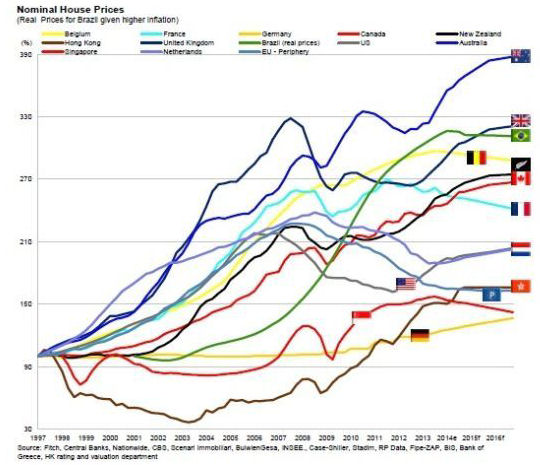
Source [of Nominal House Prices diagram]: http://www.abc.net.au/news/2015-01-15/fitch-graph-of-housing-price-growth-since-1997/6018762
Thus Australians have shown very low elasticity of demand for housing, absorbing huge cost increases with relatively little change in purchasing behaviour – accommodated by a massive change in debt, impacting on consumption behaviour and work-life balance. A declining proportion of income spent on every-day consumption means a smaller multiplier-effect of each person’s productivity in the whole economy: fewer jobs are needed to service this consumption, while more people try to increase their hours of work to pay their mortgage. Workforce participation can only fall as the least competitive in the labour market are forced out.
There are two main reasons for this low elasticity:
a) Conditions in the rental market have worsened also, making long-term renting ever less attractive. Median rent statistics hide the fact that new additions to the rental stock offer less and less amenity. Like-for-like, rents have risen faster.
b) Expected further inflation of housing makes those without property nervous that they will be permanently locked out if they do not buy in as soon as possible.
It is often argued in the media that rising house prices have been driven by Australians demanding bigger and fancier houses. This is patently untrue. If it were true, the standard post-war three-bedroom bungalow in inner ring suburbs would be decreasing in value. The average ‘house’ may have increased in size, but not the average abode, when apartments are included. It is land which is inflating, not the cost of construction nor the scale of homes.[7]
The truth is that the average standard of accommodation in Australia has been steadily declining, with the average young couple settling for a smaller apartment, in a noiser and less green neighbourhood, with less contact with neighbours, and/or a greater distance from work and community amenities. Most will have spent more of their adult life either in their parental home or in share-houses, than their parents’ generation. Most will spend a far greater proportion of their life-time earnings just keeping a roof over their head. All these factors contribute to considerable loss of quality of life in Australia.
An increasing number of reports document the social stresses of housing unaffordability. The Age reported on multiple families living together because they can't afford the rent.[8] Minimum wage workers are being pushed to the fringes of Sydney, with UWS urban studies researcher Dallas Rogers affirming that geographical separation of rich and poor creates a cycle of disadvantage.[9]
The inflation of house prices does not benefit home owners, as the inflation will equally affect the home they buy to replace one sold. This was well explained in a recent letter in the Canberra Times:
“If you bought a house in 1995 for $200,000 and sold it in 2007 for $600,000, how much profit did you make?
“A) Nil. B) About $200,000. C) $400,000. D) None of the above. The correct answer for most people would be D. If it was your only house, you would have needed to buy another house in 2007 to replace the one you sold. An equivalent replacement would cost $600,000. Add to that the costs of selling (say $20,000) and the costs of buying and moving (around $40,000), then you would have spent an extra $60,000 to be in the same position you were in 1995.
“Many people think that they are better off when the price of their house goes up. They aren't. It is still the same asset. What does go up is their capacity to borrow.
One of the most outstanding achievements of the last Liberal/National government was to double household debt. The profit of Australia's major banks was closely aligned with this increase in debt.”[10]
The Reserve Bank of Australia suggested that consumption growth in Australia will depend on further housing inflation, with the ‘wealth effect’ (the illusion of greater wealth) encouraging households to spend.[11] Thus they are relying on households exercising their greater capacity to borrow, using debt to pump up GDP. Given the effect of housing unaffordability on the ability of households to save for retirement, others stress importance of housing equity to fund retirement, advocating the use of reverse mortgages. Yet, if households are coerced into spending their growing home equity instead of paying down their mortgage, they will not have equity to draw on in retirement. This attitude appears to be merely kicking the can down the road – to land in a very rocky place, when the current young and over-leveraged cohort reach retirement. Private debt cannot sustainably grow GDP any more than fiscal debt, and it’s about time our macroeconomists admitted it.
In an article in The Conversation, Keith Jacobs argues that the majority of people would benefit from falling real estate prices, but the media and political discourse spruiks housing inflation as enrichment:
“Why has this crisis of affordability not been addressed by government? A major reason is that powerful industry groupings such as the financial sectors, property developers and real estate lobby groups have been spectacularly successful in maintaining pressure on the policymakers to privilege wealthy homeowners at the expense of less well-off households.”[12]
Demand and supply drivers in the housing market
The main factor driving these stressors is population growth.[13] Population did not initiate the past 15 years’ hyper-inflation – that was primarily the capital gains tax discount. But population growth was used since the mid-2000s to prop up the bubble caused by that rash and inequitable gift to the rich.
Was it the faltering of housing inflation in 2011 that caused the Gillard government to backflip on its election promise of reducing immigration, and further escalate population growth despite worsening unemployment?
In countries with stable populations, like Germany, property values are near stable, and housing is not a magnet for speculative investment. It is free instead to serve its occupants. Japan’s property bubble ended as its population growth tailed off. Australia’s population growth remains far higher than almost all other OECD countries. This is not only at the expense of affordable housing, but of fiscal balance, with the increased infrastructure costs amounting to over $100,000 per person added[14] , and already accounting for State government debts.[15]
Yet, because it forces up aggregate levels of debt, population growth is great for the banks. Unfortunately, policy-makers tend to turn to banks for macroeconomic advice, apparently oblivious to the conflict of interest between the banks and the populace they leverage. CommSec’s quarterly State of the States reports, which Premiers spruik as a measure of their personal success, invariably places population growth as a dominant determinant of economic performance. Yet the same reports show incomes more consistently outstripping cost-of-living in the states with least population growth. Only by ignoring per capita metrics are the faster-growing states portrayed as more successful. If headline economic indicators were routinely reported per capita, and change in public and private debt were subtracted from them, we would have a much more realistic view of wealth trends. This is the story the banks do not want to tell.
It is frequently claimed that house price rises are due to inadequate supply of housing. This excuse is wearing thin with the public, who see that government policy has taken every opportunity to increase demand. In addition to the expanded immigration program has been added increasing access of foreign investors to Australian real estate. The capital gains tax discount remains sacred, even as welfare and community services are sacrificed as ‘fiscally irresponsible’. Intermittently, first-home-buyer grants further fuel demand and ratchet up prices.
Foreign investment in real estate does not increase supply, it merely fuels the demand, and further displaces prospective home-owners. Without foreign capital inflows, the supply of housing outstripped demand growth continuously from 1950 to 2007.[16] There is an acknowledged tendency for foreign owners, particularly Chinese, to leave properties empty,[17] with the effect that their purchase decreases, rather than increases, housing supply. If developers claim that they can no longer find up-front funding for new ventures on-shore, it is only because, at the current value of land, their proposed development is not commercially viable. A liberal government should not be interfering in the market-place to prop up such unviable ventures.
By introducing investors who have much lower costs of capital than Australians, as well as providing a haven for those who may be laundering corrupt earnings,[18] the prices can be ratcheted even further beyond what is economically rational for Australians. This can only progressively lock Australians out of home ownership, and leave them increasingly beholden to foreign landlords.
Such fuelling of demand plays into the hands of those with control over supply. A recent University of Queensland study[19] found that speculation in peri-urban land was highly lucrative for those with political connections, who have more than a knack for picking the next area to be rezoned. Likewise, approvals for height relaxations on inner urban developments are equally lucrative. It serves developers to present supply as the problem for housing affordability, and themselves as the heroic saviours. Their claims that foreign investors are needed to get projects up are purely self-serving. Their investment in numerous lobbyists and think tanks spruiking population growth ensures that supply is never met, and ever more concessions from government can be requested to help them ease the pressure that they themselves have bought and paid for.
The proportion of investment housing relative to owner-occupied housing
The main impact of the capital gains tax discount was to attract investors into the property market, massively intensifying demand. It goes without saying that housing investment decreases home ownership. Investors need tenants, and those households competed out of home ownership by cashed-up investors are forced to remain tenants. Population growth ensures rental vacancy rates are kept very low, forcing up rents and motivating renters to stretch their credit limit to purchase property. Once heavily mortgaged, both home owners and investors depend on further price increases to recover their investment. But this can only happen at the expense of younger people entering the housing market, each cohort facing higher indebtedness than the last. Each year housing inflation continues, more investors are attracted, further decreasing the proportion of housing that is owner-occupied. It is a vicious cycle.
The Prime Minister was clearly declaring himself on the side of investors against home-owners, when he recently said “I do hope that our housing prices are increasing.” Anyone who thinks that property owners can continue enjoying investment growth well above CPI, without housing affordability deteriorating inexorably, is deluding themselves. Yet, as the old adage goes,
“It's hard to get someone to understand something when their salary depends on them not understanding it.”
The impact of current tax policy at all levels
Tax policy currently preferences investors over home owners, particularly through the following elements:
• Capital Gains Tax discounting;
• Tax deductibility of interest rates;
• Depreciation of buildings;
• Negative gearing.
Together, these measures mean that financing an investment property is much cheaper than financing a home. This is inequitable. Changes should aim to level the playing field, removing systemic advantages of investors over owner-occupiers.
No interest payments on real estate should be tax deductible. These are not productive investments, they merely serve to flood demand and inflate housing prices. Those with money to invest should be free to invest in property, but those who have to borrow to do so should not get special treatment from government, as if they are doing the economy a favour, because they are not.
The ability to depreciate buildings, rather than merely deduct the costs incurred in maintaining them, is also an inequitable means for investors to minimise their costs. In a rising market, where the building has probably increased in value in spite of wear and tear, this is a dishonest device which further disadvantages owner-occupiers.
The capital gains tax discount is a gift from the tax-payers to the richest members of society. Saul Eslake documented the extent to which the introduction of this discount in 1999 stimulated an enormous increase in the use of the negative gearing facility to shift taxable income to lightly-taxed capital gain.[20] Borrowing for property investment and the proportion of loss-making landlords increased dramatically.
Before the capital gains discount, negative gearing was mostly only a means of deferring tax from current income to future capital gain. However, the ability to deduct interest and depreciation contributed to the amount of income offset. It is the capital gains discount that has turned negative gearing into a major tax rort. Saul Eslake (op. cit.) estimated the tax avoided to be in the order of $5 billion in 2011. He concluded, “This is a pretty large subsidy from people who are working and saving to people who are borrowing and speculating.”
The claim that abolition of negative gearing would force rents up has been debunked by a number of commentators, who have demonstrated that its abolition between 1985 and 1987 did not result in any consistent rent response across Australian cities – in Sydney and Perth, where vacancy rates were unusually low, rents rose, but in other cities they were unchanged or fell.[21]
Other measures have been implemented to advantage first-home buyers in the marketplace. These include first-home buyers’ grants and stamp duty waivers. These measures invariably serve merely to push the price of real estate further upward. Prices are limited by buyers’ capacity to pay, and if this is supplemented by government, the first-home buyers simply pay more. The impact on prices affects all buyers, and has the impact of increasing total mortgage debt carried by the community.
What is needed is to remove the advantages enjoyed by speculative investors, not to fuel an arms war between investors and home buyers.
Opportunities for reform
It is not difficult to identify a range of measures which would stem housing inflation and shift speculative investors to more productive investments. What is lacking is the political will.
The following measures are roughly in order of impact, from the greatest and most certain to the least or less probable.
1. Drop immigration quotas significantly and tighten conditions on most forms of temporary work immigration, allowing population growth to taper off.
2. Remove the capital gains tax discount (across all forms of investment income), allowing only a CPI adjustment. Capital gains tax should not apply to the family home, or at least should be net of all expenses in buying the next home.
3. Disallow foreign investment in property. This is purely inflationary, and allows foreigners privileges in Australia which are not reciprocated.
4. Disallow mortgage interest payments and building depreciation as tax deductions.
5. End negative gearing, allowing tax deductions to be claimed only against the income from the activity that incurs them (but permitting costs to be carried forward against future rents or capital gains).
Land tax has been proposed as an additional measure, but is problematic in an inflating housing market. It means that people can no longer even count on home ownership to insulate them from rising costs of housing. As their home rises in market value, through no fault of their own and conferring no advantage on them, they nevertheless face rising tax. Rates are already a land tax that many long-term residents find hard to endure. A land tax can only force more of them out and accelerate the geographical separation of rich and poor.
However, tax on vacant property may be worthwhile, to deter speculative behaviour and prevent investors withholding stock from the market. Any property vacant for more than three months, without being under contract or development application, may be subject to the tax.
The nation’s elected representatives need to decide whether they support:
- on the one hand, ongoing profiteering by developers and real estate speculators, who are increasingly not even Australian, knowing that this can only mean increasing levels of household debt, housing stress, homelessness, inequality of wealth and geographic separation of rich and poor generating slums, crime and civil unrest,
- or on the other, stabilisation of land values and the diversion of speculative investment to productive uses in enterprise and infrastructure, knowing that this means an overall drop in investment returns (including their own) compared with recent expectations, but may avert a bigger drop that an over-inflated bubble must ultimately cause.
To use Tony Abbott’s parlance, “Whose side are you on?”
A rational and sincere public servant should know that the current situation is unsustainable and highly damaging to the fabric of society. Unfortunately I have seen little evidence of such a combination of wisdom and sincerity.
“Surely by now there can be few here who still believe the purpose of government is to protect us from the destructive activities of corporations. At last most of us must understand that the opposite is true: that the primary purpose of government is to protect those who run the economy from the outrage of injured citizens.”
Derrick Jensen – “Endgame: The Problem with Civilization”
Jane O’Sullivan
June 2015
FOOTNOTES
[1] Forbes 02/02/2014. In World's Best-Run Economy, House Prices Keep Falling -- Because That's What House Prices Are Supposed To Do. http://www.forbes.com/sites/eamonnfingleton/2014/02/02/in-worlds-best-run-economy-home-prices-just-keep-falling-because-thats-what-home-prices-are-supposed-to-do/
[2] van Onselen, L. 2015 Winners and losers in negative gearing reform. Macrobusiness 31/05/2015. http://www.macrobusiness.com.au/2015/03/will-hurt-negative-gearing-reform/
[3] Leith van Onselen 2015. Australian household debt ratios hit record. Macrobusiness 31/05/2015 http://www.macrobusiness.com.au/2015/03/australian-household-debt-ratios-hit-record/
[4] Kenneth Davidson 2015. Left out in the cold by a state reluctant to invest. The Age, 25/01/2015.
[5] The Economist 31/01/2015. Safe as Houses. http://www.economist.com/news/finance-and-economics/21641206-banks-have-been-boosting-mortgage-lending-decades-expense-corporate
[6] LF Economics 2015. Housing affordability in Australia. https://gumroad.com/l/UXjubSee summary at http://www.macrobusiness.com.au/2015/04/oz-housing-affordability-measured/
[7] Van Onselen 2015. Australia’s idiotic land bubble. Macrobusiness 10/04/2015. http://www.macrobusiness.com.au/2015/04/australias-idiotic-land-bubble/
[8] The Age, 20/01/2015. Multiple families living together because they can't afford the rent.
[9] Inga Ting 2015. The Sydney suburbs where minimum wage workers can afford to rent, SMH, 9/6/2015 http://www.smh.com.au/nsw/the-sydney-suburbs-where-minimum-wage-workers-can-afford-to-rent-20150608-ghjc6v.html
[10] Keith Calvert, Phantom Profit, The Canberra Times 4/6/2015.
[11] Michael Pascoe 2015. RBA remains dovish, but that's no surprise. Sydney Morning Herald 8/05/2015. http://www.smh.com.au/business/the-economy/rba-remains-dovish-but-thats-no-surprise-20150508-ggx4s9.html
[12] Jacobs K. 2011. Why falling house prices aren’t the calamity the media would have you believe. The Conversation, 13/12/2011. http://theconversation.edu.au/why-falling-house-prices-arent-the-calamity-the-media-would-have-you-believe-4547
[13] Ridiculous immigration fires housing spike – Bob Carr. The Australian http://www.theaustralian.com.au/national-affairs/immigration/ridiculous-immigration-fires-housing-spike-bob-carr/story-fn9hm1gu-1227393713757
[14] O’Sullivan J. 2014. Submission to the Productivity Commission Inquiry into Infrastructure provision and funding in Australia. http://www.pc.gov.au/__data/assets/pdf_file/0004/135517/subdr156-infrastructure.pdf
[15] Daly, J. 2014. Budget pressures on Australian governments 2014. Grattan Institute. http://grattan.edu.au/report/budget-pressures-on-australian-governments-2014/
[16] Soos P. 2011. Debunking the myths peddled by Australia’s property bubble ‘deniers’. The Conversation 14/12/2011. https://theconversation.com/debunking-the-myths-peddled-by-australias-property-bubble-deniers-4488
[17] Callick, R. 2015. Why the Chinese are willing to pay over the odds for local property. The Australian, 11/06/2015. http://m.theaustralian.com.au/business/opinion/why-the-chinese-are-willing-to-pay-over-the-odds-for-local-property/story-e6frg9fo-1227392052366
[18] Nick McKenzie, Richard Baker, John Garnaut 2015.Corrupt overseas buyers ramp up property price, burn locals. The Age, 23/06/2015. http://www.theage.com.au/national/corrupt-overseas-buyers-ramp-up-property-price-burn-locals-20150622-ghu5pn.html
[19] Murray C. and Frijters P. 2015. Clean Money in a Dirty System: Relationship Networks and Land Rezoning in Queensland. IZA Discussion Paper No. 9028, April 2015. http://ftp.iza.org/dp9028.pdf
[20] Saul Eslake 2013. Fifty years of housing failure. Address to the 122nd Annual Henry George Commemorative Dinner The Royal Society of Victoria, Melbourne 2nd, September 2013. https://www.prosper.org.au/2013/09/03/saul-eslake-50-years-of-housing-failure/
[21] Greg Jericho 2015. Negative gearing: a legal tax rort for rich investors that reduces housing affordability. The Guardian 19/03/2015. http://www.theguardian.com/business/grogonomics/2015/mar/19/negative-gearing-a-legal-tax-rort-for-rich-investors-that-reduces-housing-affordability
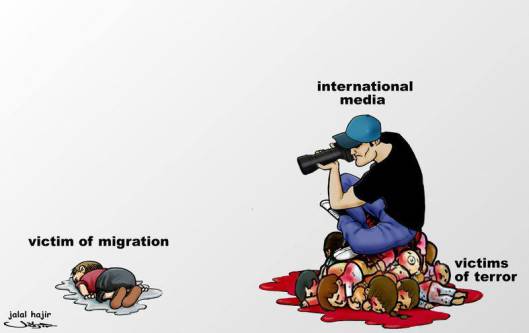

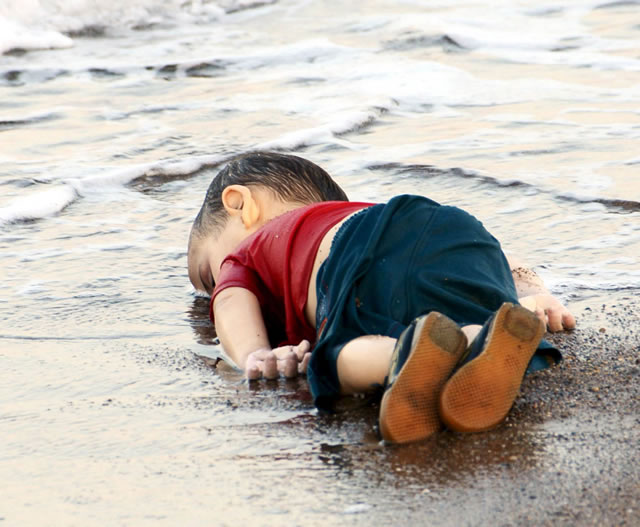
 "Australia's GDP per capita went backwards in the June quarter, sliding by 0.2 per cent. Reports that it increased depend on the use of "population creep". GDP increased by 0.2 per cent, but that was only due to population growth, and GDP per capita, which is a far more accurate guide to living standards than GDP, declined.
"Australia's GDP per capita went backwards in the June quarter, sliding by 0.2 per cent. Reports that it increased depend on the use of "population creep". GDP increased by 0.2 per cent, but that was only due to population growth, and GDP per capita, which is a far more accurate guide to living standards than GDP, declined.
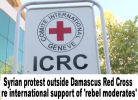
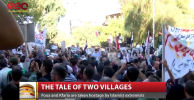 While European governments cry crocodile tears over the mass migration of people from this region, Syrians are trying to get them and the US to stop backing so-called 'rebels' who are the very ones forcing people out of the region. The video inside came to candobetter.net from a source describing itself as 'a group of Syrian journalists (living in Syria) who have created a new Middle East Channel'. The video shows Syrian civilians who have come from near Idlib protesting outside the Red Cross in Damascus about the silence of the international press on the predicament of two villages isolated behind enemy ['rebel'] -held areas above Idlib, where two villagers have been kidnapped by Islamic extremists.
While European governments cry crocodile tears over the mass migration of people from this region, Syrians are trying to get them and the US to stop backing so-called 'rebels' who are the very ones forcing people out of the region. The video inside came to candobetter.net from a source describing itself as 'a group of Syrian journalists (living in Syria) who have created a new Middle East Channel'. The video shows Syrian civilians who have come from near Idlib protesting outside the Red Cross in Damascus about the silence of the international press on the predicament of two villages isolated behind enemy ['rebel'] -held areas above Idlib, where two villagers have been kidnapped by Islamic extremists.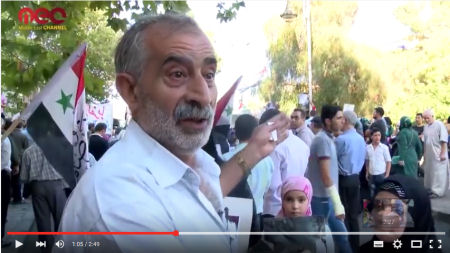 The man pictured is saying, "Where's the UN? Where's the Human Rights? Where are all of these NGOs? If someone got a stomach ache or had diarhorrea in Douma, they get alerted and make a statement, starting by Ban Ki Moon. And so on. While we are 4000 people, Kfaria and Foua, [the abducted villagers] and nobody cares about us."
The man pictured is saying, "Where's the UN? Where's the Human Rights? Where are all of these NGOs? If someone got a stomach ache or had diarhorrea in Douma, they get alerted and make a statement, starting by Ban Ki Moon. And so on. While we are 4000 people, Kfaria and Foua, [the abducted villagers] and nobody cares about us." UPDATE 29 September 2015, Click
UPDATE 29 September 2015, Click 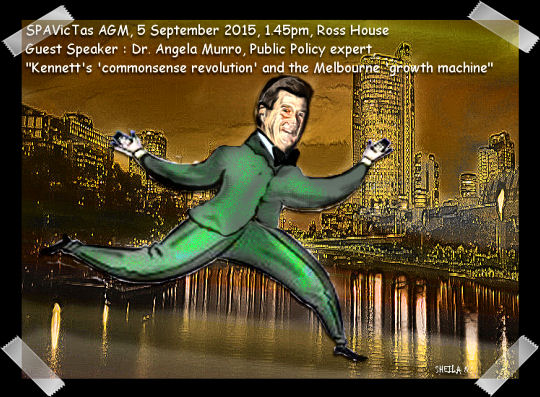 Sustainable Population Australia,
Sustainable Population Australia,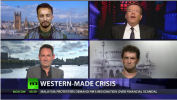 Video inside: Obviously it is deeply disturbing for ordinary European populations to realise that wave upon wave of immigrants are now arriving from the war torn states of the Middle East. Why is it that the only voices raised are calling to let all refugees in, but none are raised against western involvement in the wars and other interventions that have caused these recently functional states to collapse? Want to hear the debate from another point of view besides the Australian, UK and US media? Watch this debate between Sukant Chandan, Anders Lustgarten, and Tim Finch. "The real and imagined refugee crisis engulfing Europe: What accounts for the EU’s near indifference to the plight of refugees clamoring to enter European countries? Could it be that these people are from countries NATO members have attacked, and turned into failed states or havens for terrorists? These refugees never wanted to leave home in the first place…" First published on RT on 31 August 2015 at
Video inside: Obviously it is deeply disturbing for ordinary European populations to realise that wave upon wave of immigrants are now arriving from the war torn states of the Middle East. Why is it that the only voices raised are calling to let all refugees in, but none are raised against western involvement in the wars and other interventions that have caused these recently functional states to collapse? Want to hear the debate from another point of view besides the Australian, UK and US media? Watch this debate between Sukant Chandan, Anders Lustgarten, and Tim Finch. "The real and imagined refugee crisis engulfing Europe: What accounts for the EU’s near indifference to the plight of refugees clamoring to enter European countries? Could it be that these people are from countries NATO members have attacked, and turned into failed states or havens for terrorists? These refugees never wanted to leave home in the first place…" First published on RT on 31 August 2015 at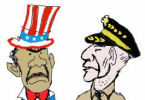 Below is a quote from Obama before he became president, counselling a completely opposite foreign policy to the warmongering one he now heads.[1] He calls for cooperation with Russia, a vigorous enforcement of nuclear non-proliferation, shutting down of the financial networks that support terrorism, pressure on the Saudis and Egyptians to stop oppressing their own people, and for an energy policy alternative to Big Oil's. Addressing the Bush government of eight years ago, he recognised the inflammatory and unfair process set in train by the United States in the Middle East. Yet now he pursues the same policy even more aggressively and dishonestly than Bush. He effectively heads a global coalition of war-criminals. Australia is a stooge in that coalition and so is the ABC, CBC, BBC, European Press, notably French mainstream press, and the Murdoch and Fairfax Press in Australia. Currently their greatest war-crime is to fail to reveal that President Bashar al-Assad is not an 'unelected dictator' but
Below is a quote from Obama before he became president, counselling a completely opposite foreign policy to the warmongering one he now heads.[1] He calls for cooperation with Russia, a vigorous enforcement of nuclear non-proliferation, shutting down of the financial networks that support terrorism, pressure on the Saudis and Egyptians to stop oppressing their own people, and for an energy policy alternative to Big Oil's. Addressing the Bush government of eight years ago, he recognised the inflammatory and unfair process set in train by the United States in the Middle East. Yet now he pursues the same policy even more aggressively and dishonestly than Bush. He effectively heads a global coalition of war-criminals. Australia is a stooge in that coalition and so is the ABC, CBC, BBC, European Press, notably French mainstream press, and the Murdoch and Fairfax Press in Australia. Currently their greatest war-crime is to fail to reveal that President Bashar al-Assad is not an 'unelected dictator' but 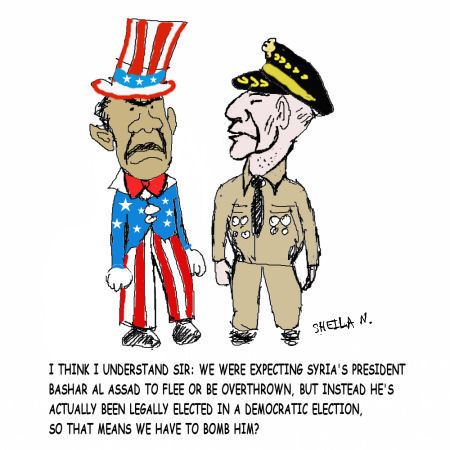
 (This article by Harrison Koehli was originally published at
(This article by Harrison Koehli was originally published at 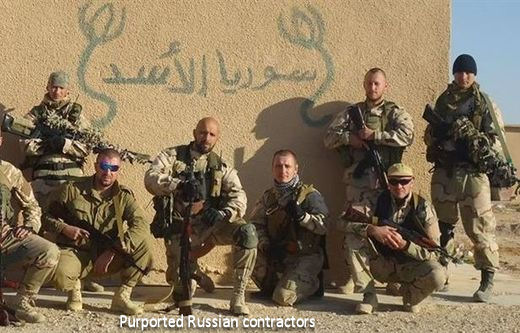



 Harrison Koehli hails from Edmonton, Alberta. A graduate of studies in music performance, Harrison is also an editor for
Harrison Koehli hails from Edmonton, Alberta. A graduate of studies in music performance, Harrison is also an editor for  "My dog doesn’t eat meat! “ declared Ann. “Neither does my cat” declared Sarah in a satisfied tone.
"My dog doesn’t eat meat! “ declared Ann. “Neither does my cat” declared Sarah in a satisfied tone. The trouble is that, from my observations, these hapless canines and felines don’t like this manufactured offering. The unfortunate mutt that I am caring for at the moment whilst his owner is on holiday is only allowed about 20 mustard coloured manufactured morsels for each of his two meals. He madly tried to get into a plastic bag in which I had disposed of a piece of kitchen paper which had absorbed a trace of meat juices whilst the pebbly plateful remained untouched. This little dog barely recognises this stuff as food. He only resorts to it after several hours and after all other avenues of nourishment have been unsuccessfully explored. He eats these granules totally without joy. Another delightful and much loved pooch of my acquaintance who is now about 8 years old has never had anything but “pebbles” pass thorough his black lips. This animal is so much loved that the couple who own him cannot go away together unless he can go with them, yet every night a dizzying array of delicacies adorns their dinner table whilst their doted on dog only gets the same diet food.
The trouble is that, from my observations, these hapless canines and felines don’t like this manufactured offering. The unfortunate mutt that I am caring for at the moment whilst his owner is on holiday is only allowed about 20 mustard coloured manufactured morsels for each of his two meals. He madly tried to get into a plastic bag in which I had disposed of a piece of kitchen paper which had absorbed a trace of meat juices whilst the pebbly plateful remained untouched. This little dog barely recognises this stuff as food. He only resorts to it after several hours and after all other avenues of nourishment have been unsuccessfully explored. He eats these granules totally without joy. Another delightful and much loved pooch of my acquaintance who is now about 8 years old has never had anything but “pebbles” pass thorough his black lips. This animal is so much loved that the couple who own him cannot go away together unless he can go with them, yet every night a dizzying array of delicacies adorns their dinner table whilst their doted on dog only gets the same diet food. This scientific study into the endangered Growling Grass Frog was released overnight and looks at how the genetic diversity of the frog is being negatively impacted by the rapid urbanisation of Melbourne’s fringe. They were once very abundant in Victoria (so abundant that they used to feed them to the snakes the Melbourne Zoo!) and now only a few populations exist around Melbourne.
This scientific study into the endangered Growling Grass Frog was released overnight and looks at how the genetic diversity of the frog is being negatively impacted by the rapid urbanisation of Melbourne’s fringe. They were once very abundant in Victoria (so abundant that they used to feed them to the snakes the Melbourne Zoo!) and now only a few populations exist around Melbourne. 
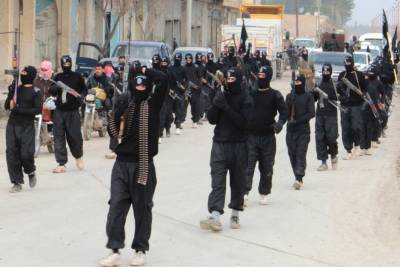
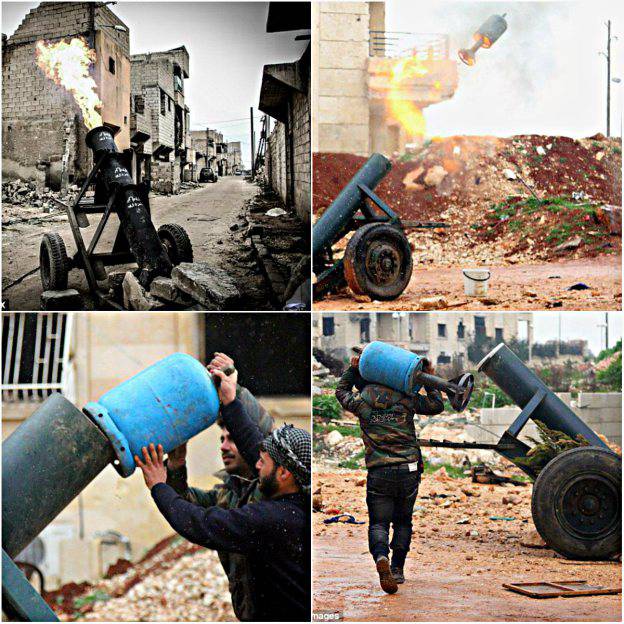
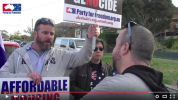 (Video inside.) Once again Nick Folkes and his Party for Freedom have come up with a very effective way to protest against foreign ownership and overpopulation through invited economic immigration and its impacts.[1] Other groups would do well to imitate these democratic initiatives especially if they differ with Party for Freedom on issues of multiculturalism but care about housing affordability and democracy, rather than simply trying to shut Party for Freedom up and, in the process, allow the growth lobby to destroy Australia. In this video Folkes and his Party continue their campaign to make real estate agents and property developers think twice about selling built property to foreign nationals. They focus on the preponderance of Chinese foreign nationals purchasing Australian property. This cannot help but get attention since the Australian mainstream media constantly popularises this issue, although it does not promote any effective way of countering it. (Note that Fairfax and Murdoch press are heavily invested in property dot coms that market Australian real estate to the world: www.realestate.com and www.domain.com). In the video inside this article Mr Folkes engages effectively with people who show both positive and negative interest in the protest for which he is a spokesperson. What next, Mr Folkes, a protest at an Australian international airport, or on the road towards it?
(Video inside.) Once again Nick Folkes and his Party for Freedom have come up with a very effective way to protest against foreign ownership and overpopulation through invited economic immigration and its impacts.[1] Other groups would do well to imitate these democratic initiatives especially if they differ with Party for Freedom on issues of multiculturalism but care about housing affordability and democracy, rather than simply trying to shut Party for Freedom up and, in the process, allow the growth lobby to destroy Australia. In this video Folkes and his Party continue their campaign to make real estate agents and property developers think twice about selling built property to foreign nationals. They focus on the preponderance of Chinese foreign nationals purchasing Australian property. This cannot help but get attention since the Australian mainstream media constantly popularises this issue, although it does not promote any effective way of countering it. (Note that Fairfax and Murdoch press are heavily invested in property dot coms that market Australian real estate to the world: www.realestate.com and www.domain.com). In the video inside this article Mr Folkes engages effectively with people who show both positive and negative interest in the protest for which he is a spokesperson. What next, Mr Folkes, a protest at an Australian international airport, or on the road towards it?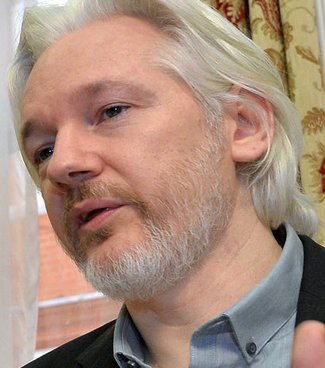
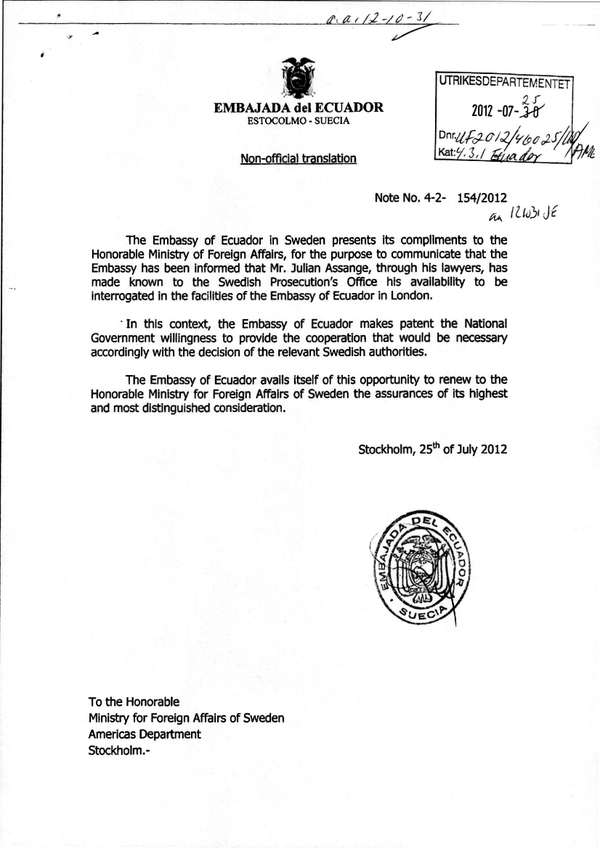
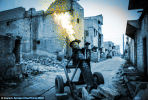 The Syrian Arab Army is fighting a war but not against anti government rebels as depicted in the mainstream media, rather its a dirty war against a merciless, depraved and bloodthirsty proxy army funded, armed and supported by the Empire interventionist alliance [US, Turkey, KSA, Jordan, NATO, Israel]. It is now well documented that Turkey is the main rat run, supplying weapons, supplies, chemical weapon ingredients and manpower often via the pseudo aid convoys. Serena Shim reported that WHO trucks were running arms and equipment to “rebels” shortly before she was killed in a mysterious car accident, after receiving death threats."HRW, Amnesty International and assorted Humanitarian offshoots are on a ceaseless crusade against the SAA use of barrel bombs. Today, Ken Roth even compared the use of Barrel bombs to the destruction caused by the nuclear bomb used on Hiroshima.
The Syrian Arab Army is fighting a war but not against anti government rebels as depicted in the mainstream media, rather its a dirty war against a merciless, depraved and bloodthirsty proxy army funded, armed and supported by the Empire interventionist alliance [US, Turkey, KSA, Jordan, NATO, Israel]. It is now well documented that Turkey is the main rat run, supplying weapons, supplies, chemical weapon ingredients and manpower often via the pseudo aid convoys. Serena Shim reported that WHO trucks were running arms and equipment to “rebels” shortly before she was killed in a mysterious car accident, after receiving death threats."HRW, Amnesty International and assorted Humanitarian offshoots are on a ceaseless crusade against the SAA use of barrel bombs. Today, Ken Roth even compared the use of Barrel bombs to the destruction caused by the nuclear bomb used on Hiroshima.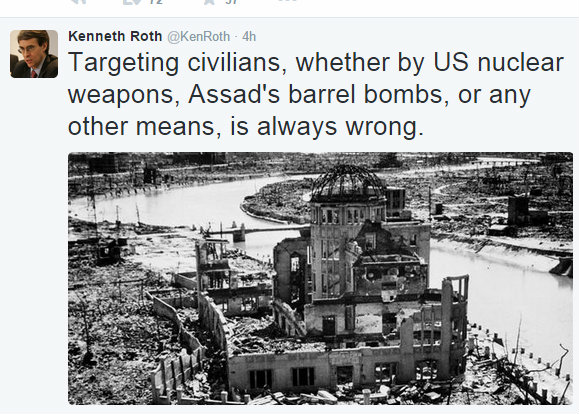

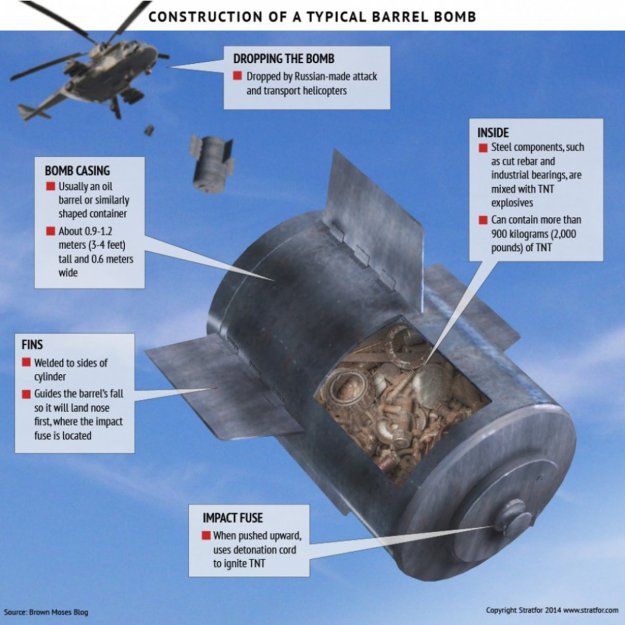

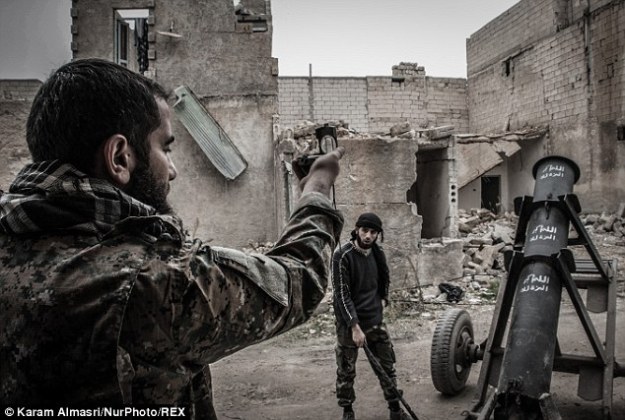
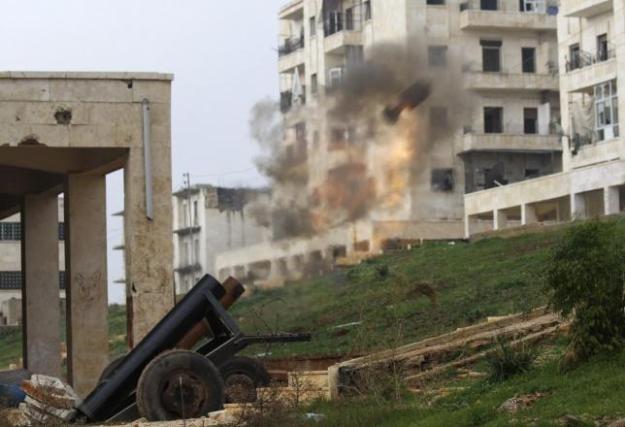

 Apart from its illegality under international law, any Australian military involvement in Syria at this stage, even to fight Da’esh, would be both illegitimate and foolish. It is past time that Australia changed its stance on refusing to recognise the legitimately elected government of Syria, and started to support Syria’s fight against the legions of foreign-backed terrorists, including Da’esh – a fight in which the Syrian army has already lost more than 100,000 soldiers, but which it is determined to win.
Apart from its illegality under international law, any Australian military involvement in Syria at this stage, even to fight Da’esh, would be both illegitimate and foolish. It is past time that Australia changed its stance on refusing to recognise the legitimately elected government of Syria, and started to support Syria’s fight against the legions of foreign-backed terrorists, including Da’esh – a fight in which the Syrian army has already lost more than 100,000 soldiers, but which it is determined to win.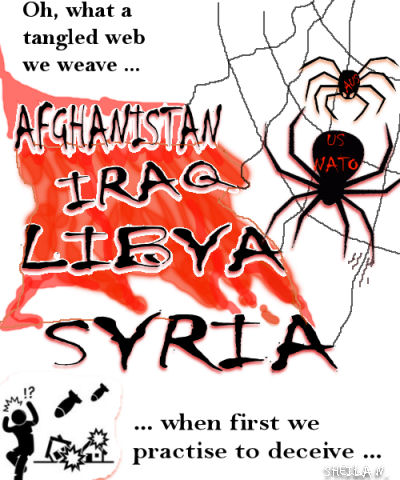 Dear Tanya Plibersek,
Dear Tanya Plibersek,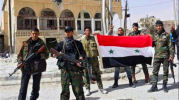
 "Home ownership is a means to an end. It is not necessary for all people in all places. What all people want is housing affordability, security, and autonomy. A place they know they can come to, where they are in control of their own lives, which can be arranged to best serve their interests, tastes and lifestyle, and which will not enslave them financially. It is these values which have been so steadily undermined in Australia over the past decade in particular.
"Home ownership is a means to an end. It is not necessary for all people in all places. What all people want is housing affordability, security, and autonomy. A place they know they can come to, where they are in control of their own lives, which can be arranged to best serve their interests, tastes and lifestyle, and which will not enslave them financially. It is these values which have been so steadily undermined in Australia over the past decade in particular.

 Although planned invited economic immigrants are far more numerous in Australia, the fuss about accepting or rejecting asylum seekers is so ridiculous when nothing is said about how the wars we support generate nearly all the refugees NATO shudders at the idea of.
Although planned invited economic immigrants are far more numerous in Australia, the fuss about accepting or rejecting asylum seekers is so ridiculous when nothing is said about how the wars we support generate nearly all the refugees NATO shudders at the idea of.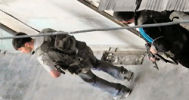 Documentary, 10 july 2015. One morning in August 2012, renowned Syrian photographer Issa Touma saw young men lugging sandbags into his street. It turned out to be the start of the Syrian uprising in the city of Aleppo. Touma grabbed his camera and spent nine days holed up in his apartment, recording what was happening outside. The result? An unprecedented glimpse into a war that has been raging for three years now. This article originally published here:
Documentary, 10 july 2015. One morning in August 2012, renowned Syrian photographer Issa Touma saw young men lugging sandbags into his street. It turned out to be the start of the Syrian uprising in the city of Aleppo. Touma grabbed his camera and spent nine days holed up in his apartment, recording what was happening outside. The result? An unprecedented glimpse into a war that has been raging for three years now. This article originally published here: 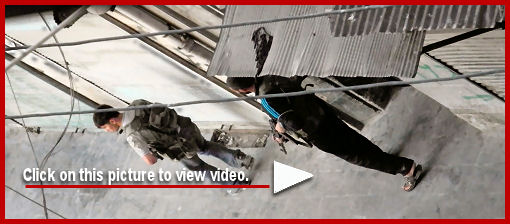

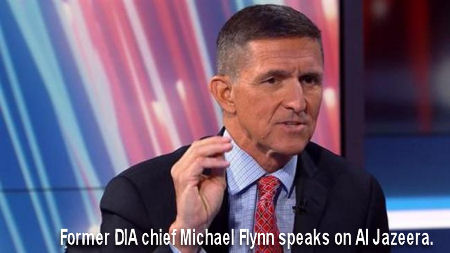 Article originally published
Article originally published  It occurred to me recently that there are four central tectonic splits within the worldwide political left. Like the tectonic plates that shift beneath the surface of the earth, these represent fundamental cleavages between different tendencies, parties and groups under the broad umbrella of the worldwide left. And, like tectonic plates, these positions clash.
It occurred to me recently that there are four central tectonic splits within the worldwide political left. Like the tectonic plates that shift beneath the surface of the earth, these represent fundamental cleavages between different tendencies, parties and groups under the broad umbrella of the worldwide left. And, like tectonic plates, these positions clash. The first split is over approaches to globalization. This refers to the major political and economic developments that have taken place over the last 40 years. Economically, it involved the internationalization of the capitalist market economy, following the gradual opening and liberalization of markets (capital, commodity, and to a lesser extent labour) primarily for the benefit of Transnational Corporations (TNCs), which now dominate the global economy.[1] Politically, it involved the gradual erosion of national sovereignty, as increasing power has become vested in transnational political, economic, and cultural institutions, leading some left theorists to argue that globalization has seen the emergence of either a
The first split is over approaches to globalization. This refers to the major political and economic developments that have taken place over the last 40 years. Economically, it involved the internationalization of the capitalist market economy, following the gradual opening and liberalization of markets (capital, commodity, and to a lesser extent labour) primarily for the benefit of Transnational Corporations (TNCs), which now dominate the global economy.[1] Politically, it involved the gradual erosion of national sovereignty, as increasing power has become vested in transnational political, economic, and cultural institutions, leading some left theorists to argue that globalization has seen the emergence of either a  In the middle class, reasonably well- heeled Melbourne neighbourhood where I have lived for the last 25 years, I have observed when out walking what I would consider to be somewhat abnormal human behavior in the form of a seeming local autism amongst the humans in the area.
In the middle class, reasonably well- heeled Melbourne neighbourhood where I have lived for the last 25 years, I have observed when out walking what I would consider to be somewhat abnormal human behavior in the form of a seeming local autism amongst the humans in the area. I will describe what happens which has led me to this realisation. Typically, I go out for a walk and in the distance I can see another person approaching on the same footpath. If the person is middle aged, as I am, the inevitable footpath meeting will pan out like this: As we pass one another with less than half a meter between us, I attempt to catch the eye of this passerby in order to make mutual acknowledgement.
I will describe what happens which has led me to this realisation. Typically, I go out for a walk and in the distance I can see another person approaching on the same footpath. If the person is middle aged, as I am, the inevitable footpath meeting will pan out like this: As we pass one another with less than half a meter between us, I attempt to catch the eye of this passerby in order to make mutual acknowledgement. 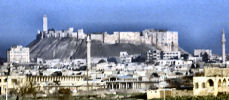 ALEPPO, SYRIA, July 27, 2015: Three stories from our Syrian correspondent in Aleppo. First he writes about the difficulties a Syrian taxi-driver encounters in travelling from one part of Aleppo to another, through 'rebel' occupied territory. The writer then describes some of the moves and countermoves between Syrian Arab Army, defending Aleppo, and 'rebels', as the rebels try to blow parts of the city up. He then inventories a number of public buildings recently damaged or destroyed as a result of these battles in Aleppo. Finally, in the section entitled, "Socially", he describes how humans have been destroyed and deformed, amputated, kidnapped, impoverished, sold into prostitution, whilst others have made strange new careers in terrorism as 'rebel's. And how such rebels contaminate peoples' homes with human faeces in order to drive them out. Candobetter.net editor: Title changed to locate Aleppo and politics on 3 August 2015.
ALEPPO, SYRIA, July 27, 2015: Three stories from our Syrian correspondent in Aleppo. First he writes about the difficulties a Syrian taxi-driver encounters in travelling from one part of Aleppo to another, through 'rebel' occupied territory. The writer then describes some of the moves and countermoves between Syrian Arab Army, defending Aleppo, and 'rebels', as the rebels try to blow parts of the city up. He then inventories a number of public buildings recently damaged or destroyed as a result of these battles in Aleppo. Finally, in the section entitled, "Socially", he describes how humans have been destroyed and deformed, amputated, kidnapped, impoverished, sold into prostitution, whilst others have made strange new careers in terrorism as 'rebel's. And how such rebels contaminate peoples' homes with human faeces in order to drive them out. Candobetter.net editor: Title changed to locate Aleppo and politics on 3 August 2015.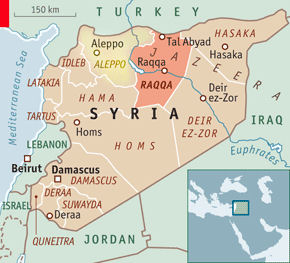 The following reports, written on a mobile phone, from Aleppo, in English that is not the writer's first language, have been edited in some parts for clarity.
The following reports, written on a mobile phone, from Aleppo, in English that is not the writer's first language, have been edited in some parts for clarity. 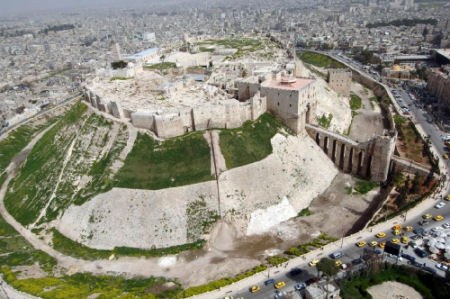
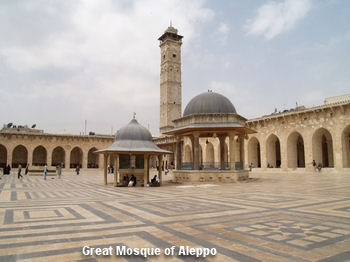
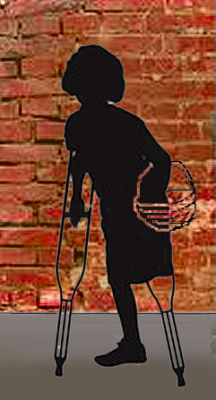
 Mark Allen from Population Permaculture and Planning locks horns so to speak with West Australian Planning Professor, Professor Newman, over Melbourne's apartment proliferation, in discussion on the Conversation website relating traffic congestion to GDP rather than to population growth, and where the professor has suggested that increasing low cost, low quality, high density appartments would solve housing unaffordability. (If you wish to contribute on The Conversation site, please hit 'newest' on the 'Comments' section to read the latest dialogue at:
Mark Allen from Population Permaculture and Planning locks horns so to speak with West Australian Planning Professor, Professor Newman, over Melbourne's apartment proliferation, in discussion on the Conversation website relating traffic congestion to GDP rather than to population growth, and where the professor has suggested that increasing low cost, low quality, high density appartments would solve housing unaffordability. (If you wish to contribute on The Conversation site, please hit 'newest' on the 'Comments' section to read the latest dialogue at: 
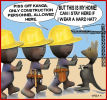 I am a member of the Hornsby Kuringai Greens, NSW and a member of the Greens Population/Sustainability Working Group. On July 18 I emailed all Senate NSW pre select candidates to ask them what they would do, if elected to the Senate, about Abbott's high population growth position, with reference to immigration, 457 visas, and growth economy addiction. I received encouraging responses back from Amanda Findley and Brad Orgill. Whilst I, like many, think it would be a great loss not to have Lee Rhianon in the Senate. She was almost frightening when she hammered home the seriousness of what we are facing with Abbott: TPP, giant coal mines etc., attack on renewable energy; but she won't budge on her position regarding population and immigration. I had a chat with her and James Ryan later and her point was that we are going to be facing thousands of people from the Pacific Islands who have been washed out of their homes by sea level rise and increasing storm frequency and intensity so how can we argue against the current rate? Also she seemed to be saying that it's too complex because of global population reality etc. Below I have published the responses I received to my Population/Immigration/addicted to growth Economy concerns.
I am a member of the Hornsby Kuringai Greens, NSW and a member of the Greens Population/Sustainability Working Group. On July 18 I emailed all Senate NSW pre select candidates to ask them what they would do, if elected to the Senate, about Abbott's high population growth position, with reference to immigration, 457 visas, and growth economy addiction. I received encouraging responses back from Amanda Findley and Brad Orgill. Whilst I, like many, think it would be a great loss not to have Lee Rhianon in the Senate. She was almost frightening when she hammered home the seriousness of what we are facing with Abbott: TPP, giant coal mines etc., attack on renewable energy; but she won't budge on her position regarding population and immigration. I had a chat with her and James Ryan later and her point was that we are going to be facing thousands of people from the Pacific Islands who have been washed out of their homes by sea level rise and increasing storm frequency and intensity so how can we argue against the current rate? Also she seemed to be saying that it's too complex because of global population reality etc. Below I have published the responses I received to my Population/Immigration/addicted to growth Economy concerns.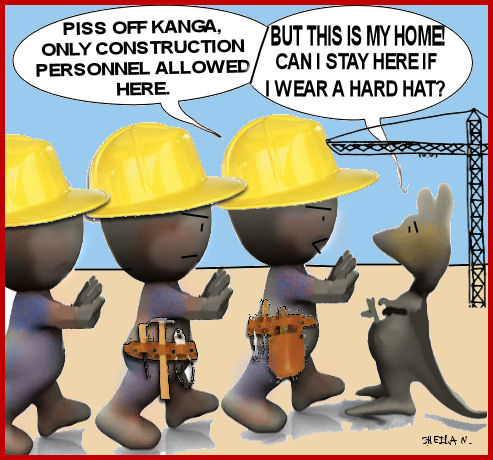 Dear Greens Senate NSW pre select candidates.
Dear Greens Senate NSW pre select candidates. 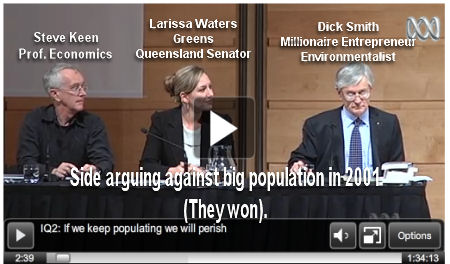



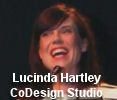

 Candobetter.net is pleased to publish Michael Bayliss's detailed account and innovative analysis of a population event that filled the Thornbury Theatre. Predictably, the official speakers were coy on the idea of population growth restraint in contrast with an audience keen to hear this addressed. Conversations from passionate members of the general community as well as the opportunity for members of the public to place the hard questions on panelists make events like this worthwhile attending. Unless one is prepared to stand up and question the experts eloquently, their business as usual paradigm will continue to be left unchecked, and the wider community needs to be shown that there are alternatives to the current paradigm that are both fair and make sense. It was perhaps telling that many of the Labor volunteers and staff at the event admitted to having never considered population issues before.
Candobetter.net is pleased to publish Michael Bayliss's detailed account and innovative analysis of a population event that filled the Thornbury Theatre. Predictably, the official speakers were coy on the idea of population growth restraint in contrast with an audience keen to hear this addressed. Conversations from passionate members of the general community as well as the opportunity for members of the public to place the hard questions on panelists make events like this worthwhile attending. Unless one is prepared to stand up and question the experts eloquently, their business as usual paradigm will continue to be left unchecked, and the wider community needs to be shown that there are alternatives to the current paradigm that are both fair and make sense. It was perhaps telling that many of the Labor volunteers and staff at the event admitted to having never considered population issues before. "We do not pretend to tell Syrians what is right for Syria, just as Syria has respected the Palestinian right to liberate Palestine since the time of the Nakba. However, we declare that the enemies of Syria are the enemies of Palestine, and those who bear arms against the Syrian people and the Syrian army – regardless of their names and affiliations – are mere pawns that serve Israel and its project to divide and control the Arab region. The people who abduct, murder and slaughter in Syria are the enemies of the Arab nation, just like Israel, with which they share goals and criminal nature."
"We do not pretend to tell Syrians what is right for Syria, just as Syria has respected the Palestinian right to liberate Palestine since the time of the Nakba. However, we declare that the enemies of Syria are the enemies of Palestine, and those who bear arms against the Syrian people and the Syrian army – regardless of their names and affiliations – are mere pawns that serve Israel and its project to divide and control the Arab region. The people who abduct, murder and slaughter in Syria are the enemies of the Arab nation, just like Israel, with which they share goals and criminal nature." Would you be surprised to know that Australia supports financing motley militia gangs to fight the
Would you be surprised to know that Australia supports financing motley militia gangs to fight the
Recent comments